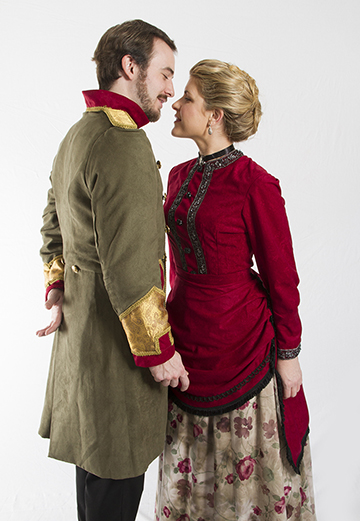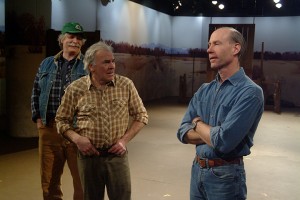Part of our ongoing series of Book-It interviews conducted by TeenTix writers.
by Olivia Menzer, Book-It TeenTix Writing Project Contributor
So you’re currently working on Anna Karenina for Book-It Repertory Theatre?
Yes, Anna Karenina. I don’t know if you’ve ever seen the book, but it’s very thick, and Tolstoy…goes on for a while. I think he wrote it before War & Peace and they are both just massive… And the Russians! (laughter)

The Russians?
Have a lot going on. And Anna Karenina is really about one woman’s struggle to break the bondage of a very parochial Russian society. But it’s also larger than that. It’s also a novel of Russia trying to find its own identity, but when you boil it down, it’s just a story about people trying to get by and figure it out.
Anna Karenina was commissioned by Chris Coleman, artistic director at Portland Center Stage, and it was about a two-year process to wrangle it into some sort of stage-worthy shape…The adaptation went through a pretty extensive workshop down in Portland and premiered in April this year (2012). And now Book-It is doing it.
With Anna Karenina and other adapting you’ve done, what is your process, and what is your long-term role in the production?
It really varies with the project. Book-It is pretty unique, using the narrative and incorporating it into the story-telling. With Anna Karenina, opposed to other adaptations I’ve done, there is a lot less verbatim dialogue incorporated into the play.
Usually, with all the Book-It productions, like Snow Falling On Cedars, and all adaptation productions, they really want a meticulous attachment to the book. In other adaptations, stuff is lifted verbatim from the book and given out to the actors. It’s very specific as to what will make a “Book-It” show. I was much less restrained with Anna Karenina. In editing it became more of a play based on a novel. So there are probably very few of Tolstoy’s particular phrasings in adapting a book that huge.
The timeline must be massive.
Exactly. So being able to depart from that was very helpful. It enabled me to use a theatrical shorthand. I still used narrative, but I think it probably worked better than trying to take all that material and funnel it down to something. Creative liberties were necessary.
So in this production, would you say that we could see a representation of your own interpretation and/or a reflection of you in the work?
I think so. And that’s the interesting thing. Two people can read that book and come out with totally different ideas of what he meant. So yes, it’s definitely—not in an egotistical way—my take on it. I actually wrote scenes that aren’t in the book, to help the audience and streamline the character arcs so it would NOT take six or eight hours to get through the play.
Do you direct? Do you prefer acting, writing, adapting to the others?
I do direct, act, and adapt. I think artists in Seattle are in a unique situation. It’s a talent pool that requires you to be ambidextrous. Opportunities will come up where you may not think of yourself as director or adapter, but “Hey, there’s an opportunity!” I was primarily an actor, and that’s really all I did, but working with Book-It has been great, because they nurture their people and artists, and have confidence and give you the confidence to do things that may not be your normal. I think the best way to spend my last years of my career may be writing for the theater, and give, hopefully, some material to the theatrical canon. I’d like to see if I could not only adapt, but also write plays as well.

So do you think acting is always your first love? Or is writing and/or adapting starting to edge it out a little bit?
There is such a thrill to acting. Like this role I’m in right now [Superior Donuts], at The Seattle Public (Theater), it is the role of a lifetime…I would pay people to do this role. It really is terrific, from Tracy Letz’s play from Steppenwolf Theatre in Chicago.
Do you find it hard it get into productions that you don’t especially personally resonate with?
Absolutely. My dance with theater has involved me getting my Master of Fine Arts degree in acting at a relatively young age, and heading out into the theatrical world. And I quickly became kind of disillusioned, because I found myself working in environments where I wasn’t confident that the people in charge were steering me in the right direction… I quit—got into the real world. I became an advertising designer, and this was in Los Angeles. I came up here in the early/mid-’90s, met my wife Jane, who is involved with Book-It. They were really just ramping up back then, so I got involved with the theater by proxy.
In this second phase of my career, I have work to do that isn’t involved with the theater. I don’t want to be dependent on the theater to pay the bills, because that’s where I get in real spiritual and financial trouble. Having it as an avocation, rather than vocation, is a much better way to do it.
What is it like to work here, in Seattle?
It’s a privilege to work here in Seattle. First, the acting community are just wonderful people, those that I’ve met. And I feel like the community supports itself. We all know there is a finite number of jobs to go around, but there is a real good nature and spirit. The dedication seems to be towards the work, instead of a person’s singular career.
So you’re all working together to bring things of substance to present?
Exactly. There is a great willingness to get out and see each other’s projects and there is such a great array of work here.
Is there anything people should know about Anna Karenina before seeing it?
I don’t think people need to have prior knowledge. Hopefully some of the milieu of czarist Russia will come across in the adaptation, and that good solid Book-It production can pull that out so the audience can get a feel not just for the characters, the mores Anna has to deal with, but also the historical context. So short answer: No.
When you’re adapting, do you ever want to just jump in AND play all the roles, acting, directing?
Sometimes. I won’t say which, but there is one part in this script I would love to be able to play.
Finally, if you could do any production, what would it be?
There is one in particular. Ray Bradbury’s Something Wicked This Way Comes. It’s a great novel of his about a malevolent carnival and two adolescent boys who come across it, and it changes their lives in unique ways, and it’s a great story. The problem is, you can’t adapt any of Bradbury’s work. He wanted control, and his estate isn’t budging on it.
Act, direct, or adapt it?
I would want to adapt that.
How do you feel about working on Anna Karenina, satisfaction-wise, compared with other work you’ve done?
This one is ultimate satisfaction for me. As I watch the characters come to life—now for the second time—that is enough of a thrill for me. I think we have a wonderful cast; I am so excited for these terrific actors. This one has just been a thrilling experience.

Kevin McKeon has adapted several novels for Book-It, and his work has been produced all over the country at theatres including Portland Center Stage, The Hartford Stage, Centerstage in Baltimore, and Theatreworks in California.
Kevin’s adaptation of Anna Karenina opens at Book-It February 5th. Click here for tickets & more information.